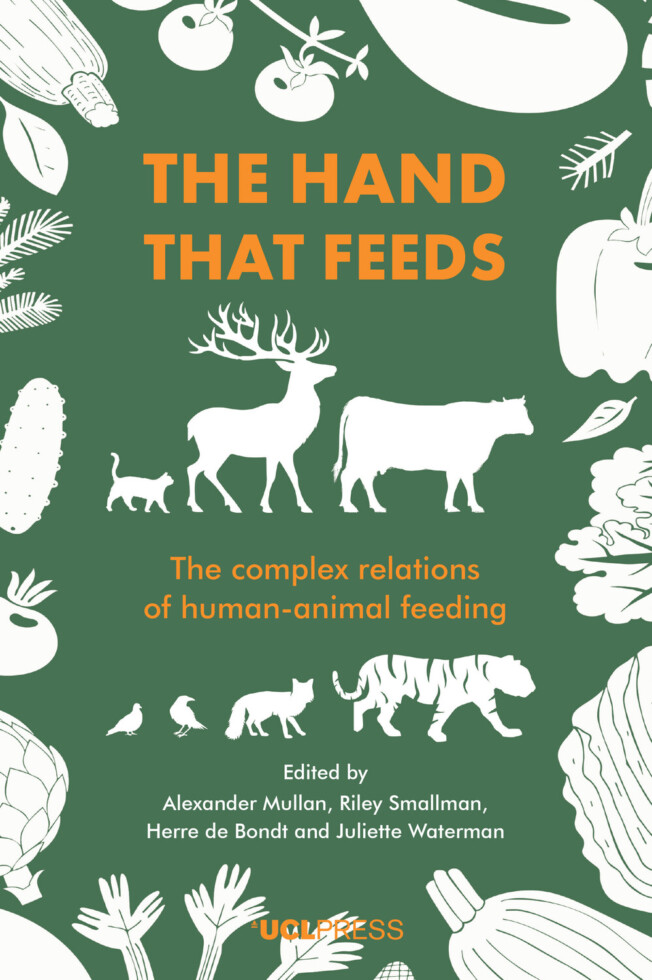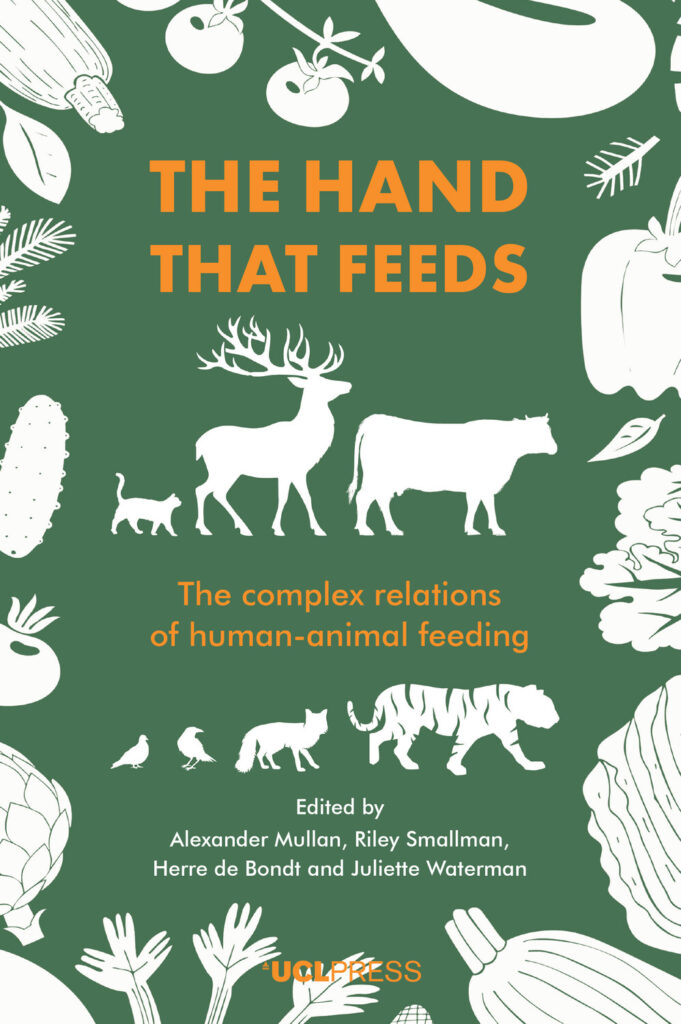
The Hand that Feeds
The complex relations of human–animal feeding
Alexander Mullan (Editor), Riley Smallman (Editor), Herre de Bondt (Editor), Juliette Waterman (Editor)
Food plays a major part in shaping human–animal relations, from nurturing farm and zoo animals to bringing wild birds into suburban gardens. Food-mediated interactions create personal interspecies bonds, enrich and alter environments, change species distributions, enable new relationships and reconfigure social perspectives, but also lead to many concerns over health and disease, for example, as well as conflicts over spaces and resources. However, previous attention has almost exclusively focused on the purpose-driven, utilitarian and economic aspects of feeding, rather than the affective and emotional encounters that motivate many feeding practices.
Presenting new research and interdisciplinary case studies, The Hand that Feeds considers animal feeding from historic to modern times. The volume explores the nuances and complexity of non-utilitarian feeding relationships, across urban and rural divides, in the wild, on the farm, at the zoo and in the garden, and how our feeding relationships have altered animal distributions and behaviours. The authors scrutinise contrasts between which species are promoted and which are persecuted, and how the species we choose to feed reflects broader world views and cultural values. Ultimately, this volume engages in the discussion of how we feed, why we feed, which animals we deem worthy of feeding and the widespread impacts of feeding relations.
Praise for The Hand that Feeds
‘An innovative and exciting collection of studies exploring the cultural phenomenon of animal feeding. Drawing on cutting-edge approaches and case studies from wild raptors to livestock and zoo animals, The Hand that Feeds has started a new conversation on this fundamental relationship between other species and ourselves.”
Aleks Pluskowski, University of Reading
‘This fascinating book explores the how, why and consequences of people feeding other species, drawing on perspectives from the historical, life and social sciences. Different voices bring diverse observations and viewpoints to a refreshingly lively and informative discussion of a topic that is anything but simple.’
Terry O’Connor, University of York
‘This is a fantastic interdisciplinary collection interrogating how human–animal relations are mediated by food…Food can be an enticement, a medicine or a poison; it can be a vehicle for protection and bonding, or distance and killing.’
Dolly Jørgensen, University of Stavanger
List of figures
List of tables
List of contributors
Acknowledgements
Need to feed: an introduction to underrepresented aspects of animal feeding
Gaia Mortier and Felix Sadebeck
1 A raw egg on an empty stomach: feeding ill cattle in Roman antiquity
Felix Sadebeck
2 Food for flight: feeding of captive raptors in medieval Britain Hannah Britton and Arthur Redmonds
3 ‘I live off them, they live off me’: exploring the human-flea feeding relationship in the history of flea circuses
Gaia Mortier
4 Human-raptor relationships in urban spaces: the history of red kites (Milvus milvus) and human food in Britain
Juliette Waterman
5 Feed the birds but stone the crows: the role of food in conflict with corvids throughout British history
Riley Smallman
6 Whose food, whose health? Moral and ecological hierarchies of urban stray cats and pigeons
Giovanna Capponi and Herre de Bondt
7 Feeding farm animals: perceptions and performances of the ‘good farmer’ amongst regenerative farmers
Hannah C. Mortimer
8 The adventures of a birch branch; or, a narrative ethnography of browse feeding at the Highland Wildlife Park
Alex Mullan
9 You are what you eat: dietary drivers of morphological change
David Cooper and Andrew C. Kitchener
10 The effects of red fox chronic exposure to metals on health and the environment
Blessing Chidimuro
11 The pros, cons and contrary consequences of conservation feeding: anthropogenic feeding of the red kite (Milvus milvus) in Britain
Virginia Thomas
Conclusion. In conversation: non-utilitarian feeding, interdisciplinarity and the future of feeding research
Herre de Bondt , Hannah Britton , David Cooper , Gaia Mortier , Hannah C. Mortimer , Felix Sadebeck , Virginia Thomas and Juliette Waterman
Index
DOI: 10.14324/111.9781800088337
Number of pages: 258
Number of illustrations: 18
Publication date: 13 May 2025
PDF ISBN: 9781800088337
EPUB ISBN: 9781800088344
Hardback ISBN: 9781800088313
Paperback ISBN: 9781800088320
Alexander Mullan (Editor)
Alexander Mullan is a PhD student at the University of Roehampton.
Riley Smallman (Editor)
Riley Smallman is a zooarchaeological PhD student at the University of Exeter.
Herre de Bondt (Editor)
Herre de Bondt is a PhD student at the University of Roehampton.
Juliette Waterman (Editor)
Juliette is a PhD student in Archaeology at the University of Reading.
‘An innovative and exciting collection of studies exploring the cultural phenomenon of animal feeding. Drawing on cutting-edge approaches and case studies from wild raptors to livestock and zoo animals, The Hand that Feeds has started a new conversation on this fundamental relationship between other species and ourselves.”
Aleks Pluskowski, University of Reading
‘This fascinating book explores the how, why and consequences of people feeding other species, drawing on perspectives from the historical, life and social sciences. Different voices bring diverse observations and viewpoints to a refreshingly lively and informative discussion of a topic that is anything but simple.’
Terry O’Connor, University of York
‘This is a fantastic interdisciplinary collection interrogating how human-animal relations are mediated by food … Food can be an enticement, a medicine or a poison; it can be a vehicle for protection and bonding, or distance and killing.’
Dolly Jørgensen, University of Stavanger
Related titles
The Hand that Feeds
The complex relations of human–animal feeding
Food plays a major part in shaping human–animal relations, from nurturing farm and zoo animals to bringing wild birds into suburban gardens. Food-mediated interactions create personal interspecies bonds, enrich and alter environments, change species distributions, enable new relationships and reconfigure social perspectives, but also lead to many concerns over health and disease, for example, as well as conflicts over spaces and resources. However, previous attention has almost exclusively focused on the purpose-driven, utilitarian and economic aspects of feeding, rather than the affective and emotional encounters that motivate many feeding practices.
Presenting new research and interdisciplinary case studies, The Hand that Feeds considers animal feeding from historic to modern times. The volume explores the nuances and complexity of non-utilitarian feeding relationships, across urban and rural divides, in the wild, on the farm, at the zoo and in the garden, and how our feeding relationships have altered animal distributions and behaviours. The authors scrutinise contrasts between which species are promoted and which are persecuted, and how the species we choose to feed reflects broader world views and cultural values. Ultimately, this volume engages in the discussion of how we feed, why we feed, which animals we deem worthy of feeding and the widespread impacts of feeding relations.
Praise for The Hand that Feeds
‘An innovative and exciting collection of studies exploring the cultural phenomenon of animal feeding. Drawing on cutting-edge approaches and case studies from wild raptors to livestock and zoo animals, The Hand that Feeds has started a new conversation on this fundamental relationship between other species and ourselves.”
Aleks Pluskowski, University of Reading
‘This fascinating book explores the how, why and consequences of people feeding other species, drawing on perspectives from the historical, life and social sciences. Different voices bring diverse observations and viewpoints to a refreshingly lively and informative discussion of a topic that is anything but simple.’
Terry O’Connor, University of York
‘This is a fantastic interdisciplinary collection interrogating how human–animal relations are mediated by food…Food can be an enticement, a medicine or a poison; it can be a vehicle for protection and bonding, or distance and killing.’
Dolly Jørgensen, University of Stavanger
‘An innovative and exciting collection of studies exploring the cultural phenomenon of animal feeding. Drawing on cutting-edge approaches and case studies from wild raptors to livestock and zoo animals, The Hand that Feeds has started a new conversation on this fundamental relationship between other species and ourselves.”
Aleks Pluskowski, University of Reading
‘This fascinating book explores the how, why and consequences of people feeding other species, drawing on perspectives from the historical, life and social sciences. Different voices bring diverse observations and viewpoints to a refreshingly lively and informative discussion of a topic that is anything but simple.’
Terry O’Connor, University of York
‘This is a fantastic interdisciplinary collection interrogating how human-animal relations are mediated by food … Food can be an enticement, a medicine or a poison; it can be a vehicle for protection and bonding, or distance and killing.’
Dolly Jørgensen, University of Stavanger

